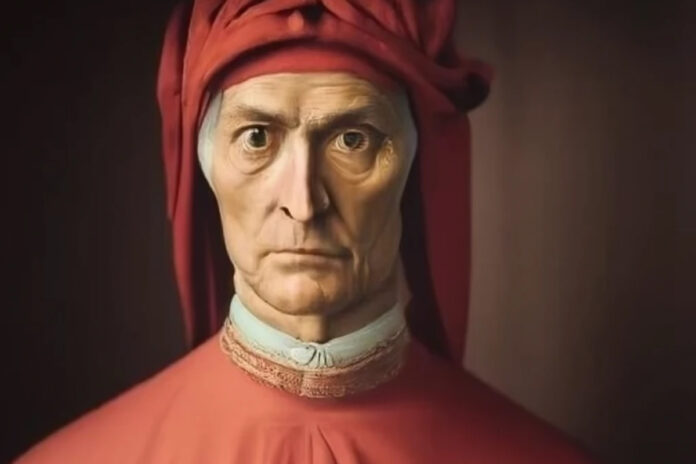Dante Alighieri, often simply referred to as Dante, is one of the most influential poets in Western literature. Best known for his monumental epic poem “The Divine Comedy,” Dante’s work has profoundly impacted literature, theology, and the arts for centuries. This article delves into Dante’s life, his significant contributions to literature, and his enduring legacy.
Early Life and Background
Birth and Early Years
Dante Alighieri was born in Florence, Italy, in 1265, into a family of moderate wealth and status. His birth name was Durante di Alighiero degli Alighieri. Florence at the time was a bustling city-state with a rich cultural and political life, which greatly influenced Dante’s upbringing and education.
Education and Influences
Dante received a classical education, studying Tuscan poetry, rhetoric, philosophy, and theology. He was particularly influenced by the works of Virgil and other classical Roman authors, as well as the troubadour poets of Provence. These early influences shaped Dante’s literary style and thematic concerns. He also studied under the tutelage of Brunetto Latini, a respected Florentine philosopher and statesman, who had a significant impact on his intellectual development.
Political Life and Exile
Involvement in Florentine Politics
Dante’s life was deeply intertwined with the turbulent politics of Florence. He was an active member of the White Guelphs, a political faction that opposed the papal influence over Florence. In 1300, he was elected as one of the six priors of Florence, a position of considerable power and responsibility. However, his political career was cut short in 1302 when the Black Guelphs, who supported the pope, seized control of Florence. Dante was exiled from the city and sentenced to death if he ever returned.
Life in Exile
Dante spent the rest of his life in exile, moving between various courts and cities in Italy. This period of displacement and hardship profoundly influenced his writing, particularly “The Divine Comedy.” Despite his political and personal struggles, Dante continued to write and study, producing works that would secure his place in literary history.
Literary Career and Major Works
Early Works
Before “The Divine Comedy,” Dante wrote several important works that showcased his literary talent and intellectual breadth. His first major work, “La Vita Nuova” (“The New Life”), written around 1294, is a collection of poems and prose that reflects his love for Beatrice Portinari, a woman he idealized throughout his life. This work combines autobiographical elements with allegorical and mystical themes, exploring the nature of love and divine grace.
“De Monarchia”
Another significant work is “De Monarchia,” a political treatise written in Latin around 1312-1313. In this text, Dante argues for the separation of church and state and advocates for a universal monarchy as a means to achieve peace and order in the world. This treatise reflects his deep engagement with the political issues of his time and his vision for a just and harmonious society.
“The Divine Comedy”
Overview and Structure
“The Divine Comedy” is Dante’s magnum opus and one of the greatest works of world literature. Written between 1308 and 1320, the epic poem is divided into three parts: “Inferno” (Hell), “Purgatorio” (Purgatory), and “Paradiso” (Paradise). Each part consists of 33 cantos, with an additional introductory canto in “Inferno,” making a total of 100 cantos. The poem is written in terza rima, a rhyming verse scheme that Dante invented.
Themes and Allegory
“The Divine Comedy” is an allegorical journey that reflects the soul’s path towards God. The protagonist, Dante himself, is guided through Hell and Purgatory by the Roman poet Virgil and through Paradise by Beatrice, who represents divine love and grace. The poem explores themes of sin, redemption, and divine justice, offering a detailed and imaginative vision of the afterlife. Through this journey, Dante addresses profound philosophical, theological, and moral questions, making the poem both a personal and universal reflection on the human condition.
Influence and Impact
“The Divine Comedy” has had a profound impact on literature, art, and theology. Its vivid imagery and masterful storytelling have inspired countless artists, writers, and scholars. The poem’s exploration of the human soul’s journey towards God has also influenced Christian thought and spirituality. Dante’s use of the vernacular Italian language in the poem was groundbreaking, helping to establish Italian as a literary language and laying the foundation for the Renaissance.
Later Life and Legacy
Final Years and Death
In the final years of his life, Dante continued to write and engage in intellectual pursuits. He completed “The Divine Comedy” shortly before his death. Dante passed away in Ravenna on September 14, 1321, at the age of 56. He was initially buried in Ravenna, and his tomb remains a site of pilgrimage for admirers of his work.
Enduring Legacy
Dante’s legacy endures through his contributions to literature, philosophy, and the arts. “The Divine Comedy” remains a cornerstone of Western literary canon, studied and revered for its literary brilliance and profound insights into the human experience. Dante’s influence can be seen in the works of later writers such as Geoffrey Chaucer, John Milton, and T.S. Eliot, among many others.
Celebrations and Honors
Dante’s legacy is celebrated around the world through various events, exhibitions, and scholarly conferences. In Italy, “Dante Day” (Dantedì) is celebrated annually on March 25th, commemorating the day he began his journey in “The Divine Comedy.” In 2021, the 700th anniversary of Dante’s death was marked by numerous cultural and academic events, highlighting his enduring impact on literature and culture.
Major Works and Their Significance
“La Vita Nuova”
“La Vita Nuova” is a significant work in Dante’s oeuvre, blending autobiography, poetry, and prose to explore themes of love and spirituality. The work is notable for its innovative use of the Italian vernacular and its influence on later Italian poetry. “La Vita Nuova” reflects Dante’s deep emotional connection to Beatrice and his belief in the transformative power of love.
“De Vulgari Eloquentia”
“De Vulgari Eloquentia” (“On Eloquence in the Vernacular”) is another important work, written in Latin around 1304-1305. In this treatise, Dante advocates for the use of the vernacular in literature, arguing that it can be as expressive and sophisticated as Latin. This work is significant for its role in promoting the Italian language and its impact on the development of Italian literature.
“Convivio”
“Convivio” (“The Banquet”), written between 1304 and 1307, is a philosophical treatise that combines prose and poetry. The work addresses various philosophical and ethical issues, reflecting Dante’s extensive knowledge of classical and medieval thought. “Convivio” is an important precursor to “The Divine Comedy,” showcasing Dante’s intellectual development and his ambition to educate and elevate his readers.
Influence on Literature and Culture
Literary Influence
Dante’s influence on literature is immense and far-reaching. “The Divine Comedy” has inspired countless writers, poets, and artists over the centuries. Geoffrey Chaucer, often referred to as the “father of English literature,” drew inspiration from Dante’s work in his own writing. John Milton’s epic poem “Paradise Lost” also shows the influence of Dante’s vision of the afterlife. T.S. Eliot, a modernist poet, considered Dante a major influence on his poetry and praised “The Divine Comedy” for its profound insights and artistic achievement.
Artistic Influence
Dante’s vivid and imaginative descriptions in “The Divine Comedy” have inspired numerous artists, including Sandro Botticelli, Gustave Doré, and Salvador Dalí. These artists have created illustrations and artworks that bring Dante’s vision to life, further cementing his impact on the visual arts. The rich symbolism and dramatic scenes in Dante’s work continue to captivate and inspire contemporary artists and illustrators.
Cultural and Theological Influence
Dante’s exploration of themes such as sin, redemption, and divine justice in “The Divine Comedy” has had a lasting impact on Christian theology and spirituality. His imaginative vision of the afterlife has shaped popular conceptions of Hell, Purgatory, and Heaven. Dante’s integration of classical and Christian thought in his work has also contributed to the broader cultural and intellectual heritage of the Western world.
Personal Life and Character
Relationships and Family
Dante’s personal life was marked by both profound love and political turmoil. His love for Beatrice Portinari, whom he first met when they were both children, remained a central influence throughout his life and work. Although Beatrice died young, Dante continued to idealize her in his writing, portraying her as a symbol of divine grace and inspiration.
Dante was married to Gemma Donati, with whom he had several children. His marriage, arranged by his family, was typical of the time and did not diminish his deep emotional and spiritual connection to Beatrice.
Political Engagement and Exile
Dante’s political engagement and subsequent exile were defining aspects of his life. His involvement in the complex and often violent politics of Florence led to his exile, which had a profound impact on his worldview and writing. Despite the hardships of exile, Dante remained committed to his intellectual and creative pursuits, producing works that reflect his deep engagement with political, philosophical, and theological issues.
FAQs
1. What are some of Dante Alighieri’s most famous works?
Dante Alighieri’s most famous works include “The Divine Comedy,” “La Vita Nuova,” “De Monarchia,” “De Vulgari Eloquentia,” and “Convivio.” These works showcase his literary talent and intellectual breadth.
2. How did Dante Alighieri influence the development of the Italian language?
Dante Alighieri influenced the development of the Italian language by writing “The Divine Comedy” and other works in the vernacular Italian, rather than Latin. His use of Italian helped establish it as a literary language and laid the foundation for the Renaissance.
3. What is “The Divine Comedy” about?
“The Divine Comedy” is an epic poem that describes Dante’s allegorical journey through Hell (Inferno), Purgatory (Purgatorio), and Paradise (Paradiso). The poem explores themes of sin, redemption, and divine justice, offering a detailed and imaginative vision of the afterlife.
4. How did Dante’s political life influence his writing?
Dante’s political life and subsequent exile had a profound impact on his writing. His involvement in the politics of Florence and his experiences as an exile are reflected in the themes and perspectives of his works, particularly “The Divine Comedy.”
5. What is the significance of Beatrice in Dante’s life and work?
Beatrice Portinari was a central figure in Dante’s life and work. She represented divine grace and inspiration, and her presence is central to “La Vita Nuova” and “The Divine Comedy.” Beatrice’s influence on Dante’s writing reflects his deep emotional and spiritual connection to her.
Conclusion
Dante Alighieri’s contributions to literature are unparalleled. His innovative use of the Italian vernacular, his profound exploration of human nature and the divine, and his masterful storytelling have left an indelible mark on Western literature and culture. From his early works like “La Vita Nuova” to his magnum opus “The Divine Comedy,” Dante’s influence continues to inspire and resonate with readers and scholars around the world. As one of Italy’s greatest literary legends, Dante Alighieri’s legacy will endure for generations to come, ensuring that his name remains synonymous with literary excellence and timeless wisdom.




